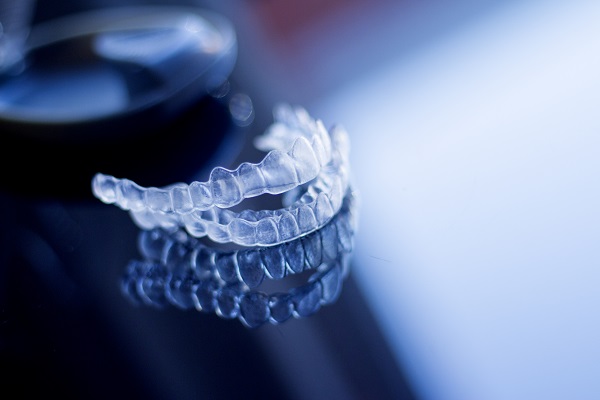Invisalign vs. Braces: Which Works Better?

Invisalign® is newer to the dental industry, and it has grown in popularity since emerging. It offers similar goals as braces do; however, the process is quite different. When considering straightening crooked teeth or correcting uneven bites, most people turn to their dentist for help. Dentists tend to recommend braces or Invisalign®, but many people are wondering which is better.
Does Invisalign® work better than braces?
Outlined below is information on both Invisalign® and braces, both of which are popular orthodontic options. Keep reading to find out which is better!
Braces
Braces have been used for years, and they are recognized as the most commonly used orthodontic treatment option. They rely on metal wires and brackets to individually straighten each tooth over time. One bracket is cemented onto the front of each tooth, and the wires feed through each bracket, connecting them all together. Over time, the teeth will shift into the desired position.
Additionally, braces can be used to correct under and overbites; however, they will also require bands to help pull the upper or lower arch forward, thus correcting the bite. Braces treatment can take anywhere from a few months to two years, depending on the severity of the patient's misalignment. Problems with the bite may take longer to correct, whereas crooked or crowding teeth may shift quicker.
Invisalign®
Invisalign® is much different than braces in the way that it appears and works. Instead of relying on metal wires and brackets, Invisalign® uses clear aligners that are custom-made to fit the patient's teeth, whether it be the upper or lower arch. The aligners are removable, which allows for flexibility and an easier treatment process. However, with flexibility comes the need for discipline. Because Invisalign® is removable, patients are more prone to taking them out throughout the day, which can delay treatment.
Dentists recommend Invisalign® for patients that have minor problems, as opposed to major ones. Typically, the aligners cannot address jaw malfunctions either. Most dentists state that patients with small spaces or minor crowding will benefit greatly from Invisalign®. Because Invisalign® works well for minor problems, treatment usually does not take as long as it does with braces.
Which is better?
In short, one option is not better than the other. However, certain patients may respond better to Invisalign® depending on their situation. It is important to outline goals and desires prior to deciding on Invisalign® or braces.
If there are major problems with the teeth and jaw, then the patient may respond better to traditional braces. However, if there are minor imperfections with the teeth, then Invisalign® might be a great option. Additionally, some dentists combine both treatments, where the patient starts with braces and ends with Invisalign®.
Learn more today!
Interested in Invisalign®? When considering orthodontic treatment, working with a dentist is a great place to start! They can perform an evaluation to determine whether braces or Invisalign® is the best option. Additionally, the dentist can go over preferences, goals and needs. Reach out today to get started or to learn more!
Request an appointment here: https://www.dentistofvisalia.com or call Visalia Care Dental at (559) 975-1213 for an appointment in our Visalia office.
Check out what others are saying about our services on Yelp: Read our Yelp reviews.
Related Posts
Preventative dental care refers to all the ways you can maintain the health of your teeth and gums, which will ultimately help prevent more severe issues down the road. One great way to provide this type of care is through treatments, including scaling and root planing, periodontal therapy, and laser gum surgery. The following are…
Preventative dental care has long been the focus of dentists and patients alike. Taking proactive steps to protect your teeth and gums not only helps you prevent tooth decay and gum disease but can also decrease your risk of developing other illnesses such as heart disease, stroke, cancer, and diabetes. Here’s how oral health affects…
The most effective way to prevent tooth decay is with preventative dental care. Everyone wants to maintain a healthy white smile for a lifetime. Your smile is your first impression and a great way to show confidence. Keeping that smile can be very easy if you follow a few easy steps.Tooth decay causes gum disease,…
Many things go into good preventative dental care. One of the most important is brushing your teeth, but it's not something that people always do correctly. Today, we will talk about brushing your teeth correctly and why it's so crucial in preventative dental care.First, you need to use an actual toothbrush. There are many options…
